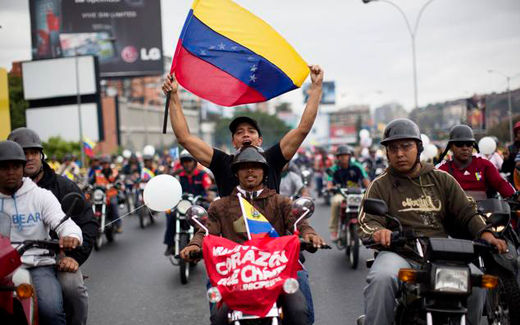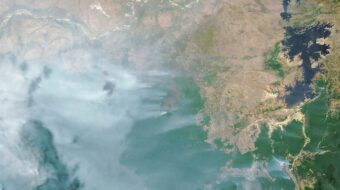
Logically, coups which have taken place in Honduras and Paraguay might serve the U.S. government as models for bringing down Venezuela’s Bolivarian Revolution. Harsh methods of the past – for example, in Guatemala (1954), Cuba (1959 on), and Chile (1973) – were problematic, and hence are rejected for the time being. Besides, they may be unnecessary.
A U.S. approach of mere watchful waiting was successful in achieving strategic goals in both countries: popular movements are stymied, elites are in charge, and governance fits with global capitalism. What actually happened deserves a look by way of suggesting what might be achieved in U.S. dealings with Venezuela using similar methods.
Honduran President Juan Orlando Hernández took office in January, 2014 after a fraudulent election. His presidency owes ultimately to the military coup that ousted President Jose Manuel Zelaya on June 28, 2009.
The U.S. ambassador knew about the coup beforehand. The plane taking Zelaya to exile stopped first at a U.S. air base. And the United States quickly recognized Porfirio Lobo as Zelaya’s successor despite voter absenteeism and electoral fraud.
Zelaya had offended by upping Honduras’ minimum wage, promoting agrarian reform, and calling for a constituent assembly. He arranged for Honduras to join the Cuban and Venezuelan-inspired ALBA solidarity alliance.
Interviewed recently, Gilberto Ríos Munguía, a leader of the opposition National Front of Popular Resistance, reported that 72 percent of Hondurans live in poverty, 53 percent, in “extreme poverty.” The minimum wage pays for less than half of families’ average monthly food costs.
Ríos Munguía accuses Honduras’ five ruling families of maintaining a “tight relationship with drug trafficking.” Now 90 percent of cocaine heading to the United States passes through Honduras, he says, adding that “In my country there are 23 murders every day … the highest rate on the planet.” Paramilitaries target students, journalists, unionists, and agrarian reform activists.
The “financial bourgeoisie” rules and “finance capital necessarily has a link with narco-trafficking.” Money is loaned at 36 percent interest, and capital flows to “Miami bank accounts.” Ríos Munguía denounces “public-private alliances;” tax-collecting is likely soon to be privatized.
Under Honduras’ new “model cities” program, private investors are responsible for local governing while they develop port facilities, build manufacturing, and expand agriculture. On April 23, the Supreme Court invalidated article 239 of Honduras’ constitution and opened the door for President Hernández to serve a second term.
In Paraguay former Catholic Bishop Fernando Lugo led a center-left coalition to electoral victory on August 8, 2008, thereby ending decades of rule by the landowner-dominated Colorado Party, once headed by military dictator Alfredo Stroessner.
A “parliamentary coup” ousted Lugo on June 22, 2012. He allegedly was “incompetent” in confronting a land reform protest that led to deaths. The real issue was his government’s refusal to allow Monsanto Corporation to introduce a new genetically-modified seed corn variety. Agricultural titans protested and Paraguay’s Senate responded by removing Lugo. The U.S. embassy knew about coup preparations from 2009 on, according to WikiLeaks.
In Paraguay 2.6 percent of the population owns 85.5 percent of the arable land; the growing of genetically modified crops, mostly soy, takes up 8,000,000 acres. Soy accounts for 40 per cent of Paraguayan exports and 10 per cent of the country’s GDP. Soy production skyrocketed from 5,968,085 tons nationally in 2008 to 8,189.542 tons in 2014.
Most crops grown in Paraguay are genetically modified for withstanding herbicides. Monsanto provides most of the seeds and chemicals used there. In 2007 soy producers applied 13 million liters of the Monsanto’s “Roundup” herbicide product. By 2014, 25 million liters of Roundup were being used, mainly for soy. The upshot is that Monsanto and big farmers have things their own way in Paraguay.
That’s bad news for human health. Toxicologists have suspected that glyphosate
(Roundup’s chemical name) causes cancers, kidney disease, and birth defects. The International Agency for Research on Cancer, part of the World Health Organization, on March 20 classified glyphosate “as probably carcinogenic to humans.”
President Horacio Cartes’ government has strengthened security forces. Appropriations for police doubled between 2009 and 2014, while military spending rose from $100 million in 2011 to $250 million in 2015. Paraguay’s Congress on August 22, 2013 authorized Cartes to initiate military action unilaterally. The pretext was leftist guerrillas operating in northern Paraguay. Soon security forces were rounding up agrarian reform leaders.
New conditions have fostered an expanding U.S. military presence in both counties. In March the announcement came that 250 U.S. marines would soon be arriving in Honduras. On February 22, 2014 in Paraguay the U.S. military opened a $1.7 million facility allegedly to provide relief for natural disasters.
The U.S. government held back on overt intrusion prior to both coups. So far it has acted similarly in regard to Venezuela, although it applauds destabilization there, subsidizes opposition groups, and issues sanctions.
But results won’t be the same in Venezuela. In neither Paraguay nor Honduras was the majority population prepared. In contrast, Venezuelans have mobilized over many years to protect their social gains and resist the predators.
The U.S. government may have another Cuba on its hands.
Photo: Rodrigo Abd/AP












Comments